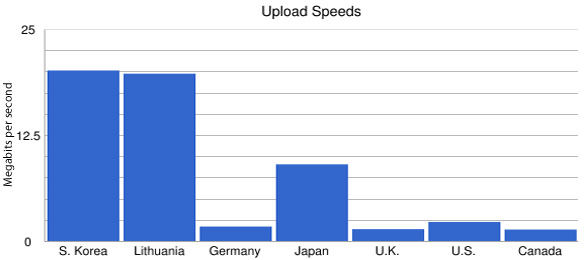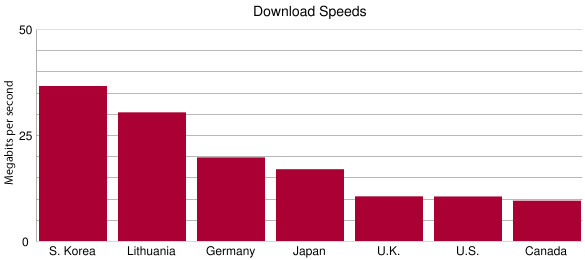Or, in hexadecimal 3F, decimal 63 and octal 77.
Tag Archives: Computers
A Keyboard for Computer Luddites
3D computer chips
As a schoolboy, having exhausted my enthusiasm for winding my own tuner coils for home-built crystal set radios, I embarked on my first transistor radio employing one red spot transistor –  something which cost many weeks of horded pocket money. The thought of a billion transistors being compressed into a square inch would have seemed inconceivable at the time. Not so today, though.
something which cost many weeks of horded pocket money. The thought of a billion transistors being compressed into a square inch would have seemed inconceivable at the time. Not so today, though.
Intel has now designed a new processor chip where transistors are smaller and use less power because of their fin shape.
From here:
Intel has unveiled its next generation of microprocessor technology, code named Ivy Bridge.
The upcoming chips will be the first to use a 22 nanometre manufacturing process, which packs transistors more densely than the current 32nm system.
Intel said it would also be using new Tri-Gate “3D” transistors, which are less power hungry.
Rival chip manufacturers including AMD and IBM are understood to be planning similar designs.
The announcement marks a significant step forward in the commercial processor industry, which is constantly striving to build more transistors onto silicon chips.
One of the main measures of its progress is the length of the transistor “gate”, measured in nanometres (1nm = 1 billionth of a meter).
A human hair is around 60,000 nm wide. Current best microchip technology features a 32nm gate.
It has been known for a long time that 22nm technology would form the next stage in the evolution of microprocessors.
However, the exact nature of Intel’s offering has been a closely guarded secret, until now.
The company expects to begin commercial production later this year.
The return of Commodore
I still have an Amiga 3000 buried in my antique computer graveyard in the basement – unless my wife found it, concluded its decomposing carcass was junk and threw it out – and now, as a reminder of the Halcyon days of display lists, blitters and 6800 assembler code, Commodore has risen from the ashes with new versions of the 64, VIC-20 and Amiga.
They are not the real thing, of course: their processors are Intel, graphics Nvidia and OS Linux.
Still, a pleasant nostalgia moment.
Internet Explorer 9 not much use for photographers
I wanted to like IE9, I really did: it is very fast and has a number of useful built-in security features.
Unfortunately, it is next to useless if you are a photographer and want to see images on a wide-gamut monitor – something photographers usually have – with anything like accurate colours.
All wide-gamut monitors come with colour profiles that Windows can use to correctly display colour information. Unfortunately Microsoft has never used these profiles in any of its version of Internet Explorer; instead it uses a default sRGB profile – IE9 is no exception. This results in every image appearing super-saturated on a wide-gamut monitor. Ironically, Microsoft trumpets IE9’s ability to correctly extract embedded colour profiles from images – but it then proceeds to nullify its efforts by displaying the image using an sRGB profile, regardless of the monitor.
Firefox has used monitor colour profiles for some time, so it’s back to Firefox for me.
For example. This is what Ava should look like:
And this is how IE9 displays her on a wide gamut monitor:
Update: I just installed Firefox 4.0 RC1 and it seems to be as fast – or almost as fast – as IE9. And the colours are right. Lot’s of other improvements, too.
Canada hacked
From here:
Prime Minister Stephen Harper assured Canadians on Thursday that the government does have a strategy in place to protect computer networks, following the revelation that at least three key departments had their systems compromised by hackers.
Harper would not comment specifically on unprecedented attacks that targeted the Finance Department, the Treasury Board, and Defence Research and Development Canada.
But he said at a press conference in Toronto that he recognized cybersecurity was “a growing issue of importance, not just in this country, but across the world.”
He added that in anticipating potential cyberattacks, “we have a strategy in place to try and evolve our systems as those who would attack them become more sophisticated.”
There is good news: Canadian apologists for Julian Assange will be dancing in the streets to express their support for free access to all government documents as their tax records appear on the Internet for everyone to peruse.
Even Borat has better Internet access than Canadians
It appears that the CRTC’s ruling to enforce usage based billing for Internet access is to be overturned. Canadian geeks are rejoicing.
Nevertheless, that doesn’t mean that Canada’s ISPs are providing particularly good service to their Internet customers – particularly on upload speeds. I subscribe to an online backup service which constantly sends the contents of my hard drives to an online server; the only problem is, Canadian upload speeds are so slow, it can take months for new files to be uploaded: in fact, Canada’s upload speeds are even slower than Kazakhstan’s. Of course, Kazakhstan doesn’t have the CRTC playing nanny.
From here:
Average upload speeds available to Canadians are even more striking in the netindex.com rankings. Canada is in 64th spot globally, at 1.35Mbps, behind smaller countries with less developed infrastructures, including:
- Mozambique, ranked 62nd, at 1.41Mbps.
- Swaziland, ranked 61st, at 1.43Mbps.
- Kenya, ranked 58th, at 1.52 Mbps.
- Kazakhstan, ranked 40th, at 2.10Mbps.


The meaning of free will: one of the oldest problems in philosophy
Roger Penrose in his book, “The Emperor’s New Mind” effectively demolished the idea that thinking is algorithmic; the belief that artificial intelligence is possible using current computational mechanisms, is also a casualty of Penrose’s reasoning.
Penrose, not being a theist, places more faith in the role of quantum mechanics in the operation of an apparent Cartesian version of free will than, say, a Christian, who might be more inclined to view free will as the result of being made in God’s image.
Some interesting new research on animals shows that, whether his quantum explanation is correct or not, Penrose’s notion that the operation of the brain is not merely algorithmic is confirmed.
From the BBC:
The free will that humans enjoy is similar to that exercised by animals as simple as flies, a scientist has said.
The idea may simply require “free will” to be redefined, but tests show that animal behaviour is neither completely constrained nor completely free.
The paper, in Proceedings of the Royal Society B, suggests animals always have a range of options available to them.
“Choices” actually fit a complex probability but, at least in humans, are perceived as conscious decisions.
The idea tackles one of history’s great philosophical debates, and Bjoern Brembs of the Berlin Free University brings the latest thinking from neurobiology to bear on the question.
What has been long established is that “deterministic behaviour” – the idea that an animal poked in just such a way will react with the same response every time – is not a complete description of behaviour.
“Even the simple animals are not the predictable automatons that they are often portrayed to be,” Dr Brembs told BBC News…..
Christof Koch, a biologist from the California Institute of Technology and frequent author on topics of free will and biology, said that the work hits at the heart of “one of the oldest problems in philosophy”.
In writing about Dr Brembs’ research, he suggested that “the strong, Cartesian version of free will—the belief that if you were placed in exactly the same circumstances again, you could have acted otherwise—is difficult to reconcile with natural laws”.
“There is no way the conscious mind, the refuge of the soul, could influence the brain without leaving tell-tale signs. Physics does not permit such ghostly interactions.”
That last sentence betrays a thoroughly unscientific preconception: that the numinous doesn’t exist. If it does exist, there isn’t any scientific reason for supposing that it could not interact with nature – physics – or, rather physicists – no matter how they exercised their free will, would have little choice but to admit it.
3D light painting with an iPad
From Google to Oh Lord in Iran
Iran is in the process of further isolating its inhabitants by replacing the evil Western Internet that assaults delicate Iranian sensibilities with so much nasty free information, with an intranet (a closed network) complete with its own search engine call “Oh Lord”. Have to keep those Mohammed cartoons at bay somehow.
Hadi Malek-Parast, Director General for Research and Development at the Iranian Information Technology Company, told the Iranian Mehr News Agency on Sunday that Iran has started developing a national search enginged dubbed ‘Ya Haq’, a Persian expression meaning “Oh Lord.”
Speaking of the need for faster search capacity and higher security for the country’s online communications, Malek-Parast said Ya Haq would be ready to launch in 2012 and referred to the project as a domestic Intranet, as opposed to an international Internet.
“They are not just developing a search engine, they want to develop an Intranet, instead of an Internet, which would be some kind of local Internet and only give access to state institutions and internally approved sites,” Pujan Ziaie, a senior IT strategist in Iran’s ‘green’ opposition movement told The Media Line. “The discussion began a few years ago and is based on a feeling that the Internet is a Western weapon. They are threatened by it but they cannot ignore it so they are trying to imitate what China has done.”




